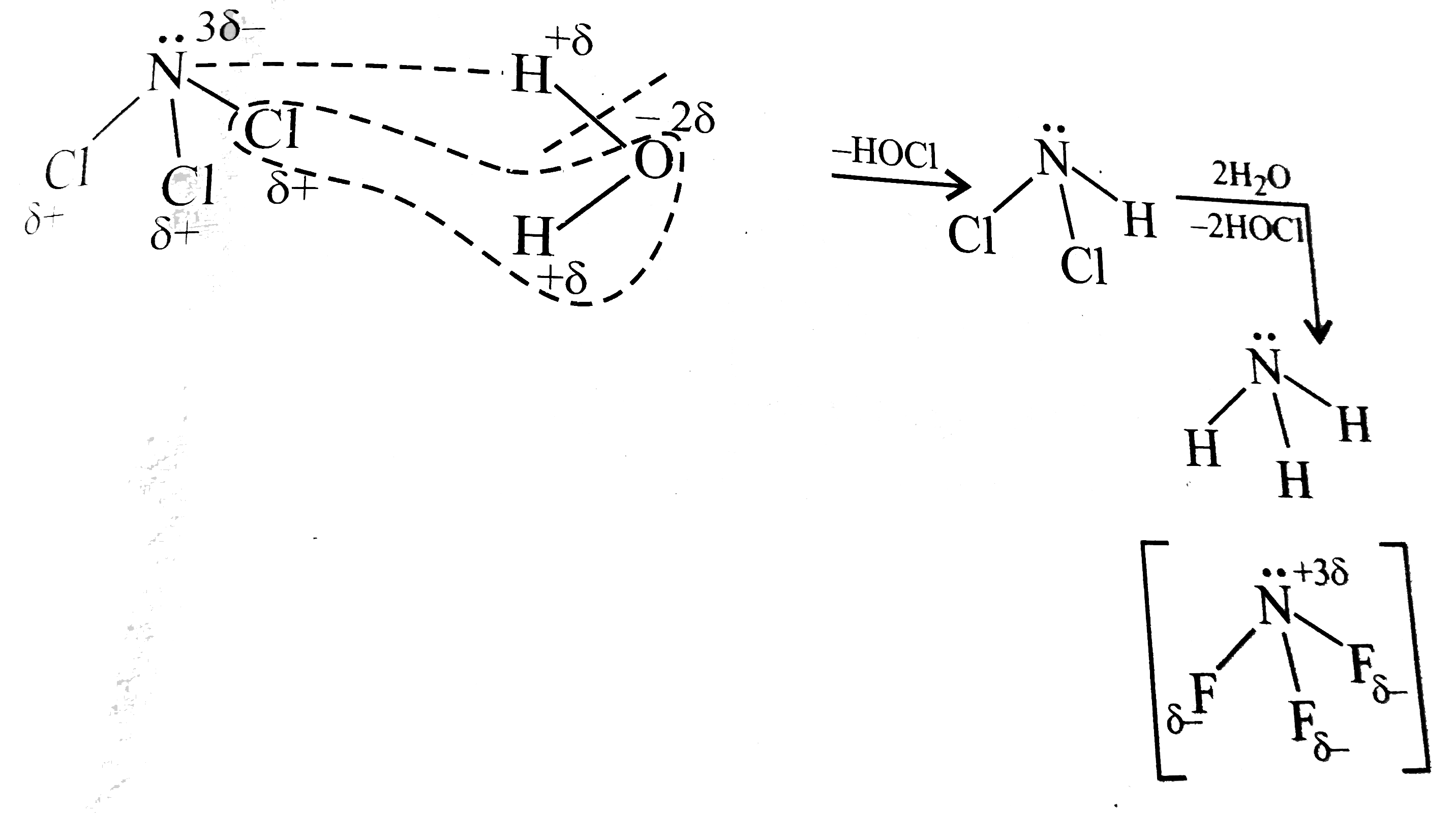Assertion NCI3 reacts with water but NF3I s inert towards hydrolysis
Reasoning Nitrogen des not possess vacant d-orbitals .
If both (A) and (R) are correct and (R) is the correct explanation of (A)
If both (A) and (R) are correct and (R) is the correct explanation of (A)
If (A) is correct but (R) is incorrect
If (A) is incorrect but (R) is correct
The correct Answer is:B
NCI3+3H2O→NH3+3HOCI
EN of N>EN of CI, so -delta centre of N of NCI3 interacts with +delta centre of H of H2O and hence gets hydrolysed to give NH3 and HOCI
NF3+H2O→NO reaction
Since EN of F>EN of N thus N has +delta charge and F has -delta charge .

Topper's Solved these Questions
- CHEMICAL BONDING AND MOLECULAR STRUCTUREBOOK - CENGAGE CHEMISTRY ENGLISHCHAPTER - CHEMICAL BONDING AND MOLECULAR STRUCTUREEXERCISE - Exercises Integer
10 Videos
- CHEMICAL BONDING AND MOLECULAR STRUCTUREBOOK - CENGAGE CHEMISTRY ENGLISHCHAPTER - CHEMICAL BONDING AND MOLECULAR STRUCTUREEXERCISE - Exercises Fill In The Blanks
20 Videos
- CHEMICAL BONDING AND MOLECULAR STRUCTUREBOOK - CENGAGE CHEMISTRY ENGLISHCHAPTER - CHEMICAL BONDING AND MOLECULAR STRUCTUREEXERCISE - Exercises Single Correct (Miscellaneous)
23 Videos
- ATOMIC STRUCTUREBOOK - CENGAGE CHEMISTRY ENGLISHCHAPTER - ATOMIC STRUCTUREEXERCISE - Concept Applicationexercise(4.3)
19 Videos
- CHEMICAL EQUILIBRIUMBOOK - CENGAGE CHEMISTRY ENGLISHCHAPTER - CHEMICAL EQUILIBRIUMEXERCISE - Subjective type
1 Videos
Similar Questions
Knowledge Check
Assertion : Dipole moment of NH3 is greater than that of NF3.
Reason : Nitrogen is more electronegative than fluorine.Aboth assertion and reason are true and reason is the correct explanation of assertion.Bboth assertion and reason are true but reason in not the correct explanation of assertion.Cassertion is true but reason is false.Dboth assertion and reason are false.Assertion: SiF4 acts as a Lewis base.
Reason: The central Si atom in SiF4 possesses vacant d- orbitals and can expand its octet by accommodating more electrons in d- orbitals
1. If both Assertion and Reason are CORRECT and a Reason is the CORRECT explanations of the Assertion
2. If both Assertion and Reason are CORRECT but Reaon is not CORRECT explanation of the Assertion.
3. If Assertion is CORRECT but Reasson is INCORRECT.
4. If Assertion is INCORRECT but Reason is CORRECT.AIf both Assertion and Reason are CORRECT and a Reason is the CORRECT explanations of the AssertionBIf both Assertion and Reason are CORRECT but Reaon is not CORRECT explanation of the Assertion.CIf Assertion is CORRECT but Reasson is INCORRECT.DIf Assertion is INCORRECT but Reason is CORRECT.
Assertion Boiling point of SiH4>CH4 whereas boiling point of SiCI4<CI4
Reasoning Chlorine possesses vacant d-orbitals but hydrogen does not .
View SolutionAssertion: Boron reacts with HNO3
Reason: Boron reacts with all acids.
View SolutionAssertion (A) : CCl4 is inert towards hydrolysis but SiCl4 is readily hyrolyse .
Reason (R) : Carbon cannot expand its octet but silicon can expand its octet .
View SolutionAssertion NO⊕ has a lower pi accepting tendency than the CO
Reason No donates 3 electrons into the vacant orbital of metal cation or atom .
View SolutionAssertion : 2nd period elements do not involve in excitation of electron.
Reason : 2nd period elements do not have vacant 2d-orbitals.
View Solution4s orbitals has less energy than 3d orbital
View Solution
